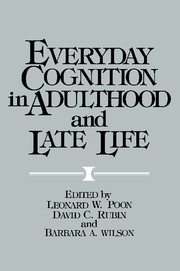Book contents
- Frontmatter
- Contents
- List of contributors
- Preface
- Part I Adult cognitive abilities in the laboratory and in real-life settings: Basic theoretical and methodological issues
- Part IA Systematic approaches to laboratory and real-world research
- Part IB Combining laboratory and real-world research
- 6 The laboratory and ecology: Supplementary sources of data for memory research
- 7 Issues of regularity and control: Confessions of a regularity freak
- 8 Finding the bloody horse
- 9 Some bad and some good reasons for studying memory and cognition in the wild
- Part II Cognition in adulthood and late life: Findings in real-life settings
- Part IIA Everyday cognitive abilities
- Part IIB Concomitant influences
- Part III Cognitive enhancement and aging: Clinical and educational applications
- Part IIIA Issues and perspectives
- Part IIIB Enhancement approaches
- Part IIIC Designing programs for cognitive rehabilitation
- Subject index
- Author index
9 - Some bad and some good reasons for studying memory and cognition in the wild
Published online by Cambridge University Press: 05 October 2013
- Frontmatter
- Contents
- List of contributors
- Preface
- Part I Adult cognitive abilities in the laboratory and in real-life settings: Basic theoretical and methodological issues
- Part IA Systematic approaches to laboratory and real-world research
- Part IB Combining laboratory and real-world research
- 6 The laboratory and ecology: Supplementary sources of data for memory research
- 7 Issues of regularity and control: Confessions of a regularity freak
- 8 Finding the bloody horse
- 9 Some bad and some good reasons for studying memory and cognition in the wild
- Part II Cognition in adulthood and late life: Findings in real-life settings
- Part IIA Everyday cognitive abilities
- Part IIB Concomitant influences
- Part III Cognitive enhancement and aging: Clinical and educational applications
- Part IIIA Issues and perspectives
- Part IIIB Enhancement approaches
- Part IIIC Designing programs for cognitive rehabilitation
- Subject index
- Author index
Summary
Why should we take research on cognition out of the laboratory into the real world? First, let me mention some reasons that I do not find compelling.
Some bad reasons
Laboratory studies produce erroneous results
“We do not need to move to the real world, because principles and facts that have been discovered in laboratory research on cognition do not apply to real life.” Although one hears assertions to this effect, I know of almost no instances in which real-life tests of well-established principles have been carried out in a sensible way and have failed. On the other hand, there have been many examples of tests and real-world applications of principles regarding human learning and cognition that were discovered in the laboratory and have proved entirely satisfactory. Moreover, Neisser's pessimism (1978) notwithstanding, some of the principles are highly nonobvious. My own favorite example concerns the spacing of practice. This demonstrably counterintuitive finding (Melton, 1970; Rothkopf, 1963; Rothkopf & Coke, 1963) initially emerged from a long and tortuous set of experiments in the most classic and abstract verbal learning tradition. By now, literally dozens of applications to instruction, the teaching of classroom materials, and the practice of motor skills have been reported in the literature. I estimate the success-to-failure ratio as at least 10:1. Often the benefits are quite dramatic.
- Type
- Chapter
- Information
- Everyday Cognition in Adulthood and Late Life , pp. 116 - 126Publisher: Cambridge University PressPrint publication year: 1989
- 6
- Cited by



